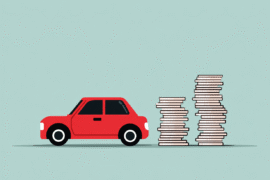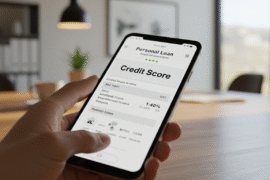This article may contain references to products or services from one or more of our advertisers or partners. We may receive compensation when you click on links to those products or services. Nonetheless, our opinions are our own.
The information presented in this article is accurate to the best of our knowledge at the time of publication. However, information is subject to change, and no guarantees are made about the continued accuracy or completeness of this content after its publication date.
When it comes to making one of the biggest financial decisions of your life, buying a house, many factors come into play. You might catch yourself daydreaming about your future home, picturing family gatherings, cozy nights by the fireplace, or a garden bursting with blooms. But before you dive into house hunting, you have a significant question to consider: Should you pay off debt first? Knowing your lifestyle, financial health, and what makes sense for your unique situation is necessary. Addressing your debt could be a smarter choice before taking that leap into homeownership, helping you balance between dreams and practicalities.
- Grasping the Financial Impact of Debt on Homeownership
- Evaluating Your Debt: Which Types Matter Most
- Calculating Your Debt-to-Income Ratio for a Mortgage
- Creating a Balanced Plan: Paying Off Debt While Saving for a Home
- Recognizing the Benefits of Waiting to Buy a House
- Taking Control of Your Financial Future: A Holistic Approach to Home Buying
- Final Thoughts
- Frequently Asked Questions
- Recommended Reads
Grasping the Financial Impact of Debt on Homeownership
When considering your financial journey toward homeownership, it’s necessary to understand how existing debt can influence your overall financial health and your ability to secure a mortgage. High levels of debt can lead to increased interest rates on loans, a reduced mortgage amount, or even rejection from lenders. Assessing your debt-to-income (DTI) ratio is needed, as most lenders prefer a DTI below 43%. This figure indicates the percentage of your monthly income that goes toward paying debts, and a lower DTI can enhance your borrowing power.
Take a moment to evaluate your current debts. Here are some considerations:
- Type of Debt: Different debts have varying impacts. Student loans, credit cards, and auto loans all count toward your DTI, but they may affect lenders’ decisions differently.
- Monthly Payments: High monthly payments can strain your budget, making it harder to save for a down payment and cover home-related expenses.
- Interest Rates: High-interest debts can become a financial burden, limiting your ability to allocate funds toward homeownership.
Here’s a simple view of how debt influences home buying:
| Factor | Impact on Home Buying |
|---|---|
| High DTI Ratio | Higher risks, possibly higher interest rates |
| Improved Credit Score | Better mortgage rates available |
| Debt Reduction | Increased borrowing capacity |
Addressing your debt before diving into the housing market, you equip yourself with a stronger financial position, paving the way for a successful purchase and long-term stability.
Evaluating Your Debt: Which Types Matter Most
Your debt landscape is important before making a significant financial commitment like purchasing a home. Different types of debt can affect your credit score and borrowing capacity in unique ways. Start by assessing your debts and categorizing them into the following types:
- Secured Debt: This includes loans backed by collateral, such as auto loans and mortgages. Typically, these have lower interest rates because they pose less risk to lenders.
- Unsecured Debt: Credit cards and personal loans fall into this category and usually come with higher interest rates. Managing this type of debt should be a priority, especially if you aim to improve your credit score.
- Installment Loans: Structured payments over time, like student loans or personal loans, can be more manageable and predictable.
- Revolving Credit: Credit cards allow for ongoing borrowing, but high usage can negatively impact your credit utilization ratio.
When considering which debts to tackle first, prioritize those with the highest interest rates and those that could hinder your mortgage application. A sound strategy would be to create a simple table to visualize your debts, interest rates, and monthly payments:
| Type of Debt | Balance | Interest Rate | Minimum Payment |
|---|---|---|---|
| Credit Card | $5,000 | 18% | $150 |
| Car Loan | $12,000 | 6% | $250 |
| Student Loan | $20,000 | 4% | $200 |
Calculating Your Debt-to-Income Ratio for a Mortgage
Knowing your debt-to-income (DTI) ratio is necessary before committing to a mortgage. This ratio compares your total monthly debt payments to your gross monthly income, helping lenders assess your ability to manage additional mortgage payments. A lower DTI indicates a healthier financial state, making you a more attractive candidate for a home loan.
To calculate your DTI, follow these simple steps:
Sum up your monthly debt payments: Include your credit card bills, auto loans, student loans, and any other debt obligations.
Determine your gross monthly income: This is your total income before taxes and deductions, including salary, bonuses, and other sources.
Calculate your DTI: Use this formula:
(Total Monthly Debt Payments ÷ Gross Monthly Income) × 100.
Most lenders prefer a DTI of 43% or lower, which can significantly increase your chances of mortgage approval. Here’s a simple table to illustrate how an acceptable DTI can affect your mortgage options:
| DTI Ratio | Loan Approval Chances | Suggested Mortgage Amount |
|---|---|---|
| Below 36% | High | $300,000+ |
| 36% – 43% | Moderate | $200,000 – $300,000 |
| Above 43% | Low | Varies |
Voted "Best Overall Budgeting App" by Forbes and WSJ
Monarch Money helps you budget, track spending, set goals, and plan your financial future—all in one app.
Get 50% OFF your first year with code MONARCHVIP
Creating a Balanced Plan: Paying Off Debt While Saving for a Home
When it comes to managing your finances, striking a balance between paying off debt and saving for a home can feel overwhelming. It’s important to prioritize your financial health by incorporating a dual approach. Start by assessing your current debts and categorizing them based on interest rates, payment terms, and total amounts. Focus on high-interest debts first, as these can significantly impede your ability to save effectively. At the same time, allocate a portion of your income toward a dedicated savings account specifically for a down payment.
Consider implementing a budgeting framework that allows you to allocate funds for both debt repayment and savings:
| Category | Allocation (%) |
|---|---|
| Expenses | 50 |
| Debt Repayment | 30 |
| Home Savings | 20 |
By consciously tracking and adjusting these allocations every month, you’ll be on a clear path to managing your debts while steadily building your home fund. Remember, it’s not only about eliminating debt but also creating that financial cushion to support your goal of homeownership and long-term stability.
Recognizing the Benefits of Waiting to Buy a House
Waiting to buy a house can often yield significant benefits that help you make a more informed and financially sound decision. When you take your time, you can assess your current financial situation and enhance your credit score, which in turn could lead to better mortgage rates. Delaying your purchase also gives you the chance to save for a larger down payment, potentially reducing your monthly mortgage payment or eliminating private mortgage insurance (PMI).
Advantages of waiting include:
- Time to Save: Build a financial cushion for unexpected expenses.
- Market Analysis: Observe trends and buy during a buyer’s market when prices stabilize or decrease.
- Debt Reduction: Prioritize debt repayment to improve your overall financial health and manage future mortgage payments more easily.
Waiting also provides the opportunity to thoroughly research and evaluate neighborhoods and homes. This diligence leads to a well-informed purchase and reduces the risk of buyer’s remorse. Here’s a breakdown of how financial stability can increase over time:
| Duration of Waiting | Potential Credit Score Improvement | Savings for Down Payment |
|---|---|---|
| 6 months | +25 points | $5,000 |
| 1 year | +50 points | $10,000 |
| 2 years | +100 points | $20,000 |
Taking Control of Your Financial Future: A Holistic Approach to Home Buying
Making the decision to buy a home can feel daunting, especially when debt is part of your financial landscape. Assessing whether to tackle your debt first or move forward with homeownership is a personal journey that requires honest reflection and a clear strategy. Focus on knowing the types of debt you’re dealing with. Generally, it’s wise to prioritize high-interest debts, such as credit cards, as they can significantly hinder your financial health.
Consider these factors when deciding:
- Debt-to-Income Ratio: Lenders assess your borrowing capacity with this metric. A lower ratio improves your chances of securing favorable mortgage terms.
- Emergency Fund: A savings buffer protects against setbacks, easing the transition to homeownership.
- Market Conditions: If the market is shifting, waiting to buy while reducing debt might offer greater benefits.
| Debt Type | Suggested Action |
|---|---|
| Credit Card Debt | Prioritize paying off |
| Student Loans | Consider income-driven repayment |
| Auto Loans | Evaluate balance vs. interest rate |
Striking a balance between managing debt and preparing for homeownership can lead to a stronger financial future. Assess your overall budget and long-term goals to create a plan that supports both your dream of homeownership and a healthier financial life.
Final Thoughts
Deciding whether to pay off debt before buying a house is not a one-size-fits-all decision, it depends on your current financial health, long-term goals, and risk tolerance. For many first-time buyers, addressing high-interest debt and reducing your debt-to-income ratio can open the door to better mortgage options, lower monthly payments, and greater peace of mind. By taking a thoughtful, balanced approach, prioritizing both debt repayment and savings, you put yourself in a stronger position to buy a home without compromising your financial stability. Ultimately, the right time to buy a house is when your finances support the dream, not strain under it.

Frequently Asked Questions
What are the advantages of paying off debt before buying a house?
Paying off debt before purchasing a home can significantly improve your financial situation. It can enhance your credit score, leading to better mortgage rates and terms. You’ll also have a lower debt-to-income ratio, which is a major factor lenders consider. Additionally, being debt-free provides peace of mind and greater financial flexibility.
How does having debt affect my mortgage application?
Lenders evaluate your debt-to-income ratio when you apply for a mortgage. High levels of debt can make it harder to qualify, as lenders may see you as a higher risk. They may also offer less favorable terms if your credit score is negatively affected by your debt.
Is it ever a good idea to buy a house while still in debt?
Yes, there are situations where buying a house while still having debt can make sense. If your debts have low interest rates and you’re financially stable enough to handle both your debt payments and a mortgage, it might be feasible. Also, if property values are rising rapidly in your area, it could make sense to buy sooner rather than later.
What type of debt should I prioritize paying off?
It’s generally wise to pay off high-interest debts, such as credit card balances, first. These can be financially burdensome over time. Also, focus on any debts that negatively affect your credit score, such as late payments or accounts in collections.
How can I effectively balance paying off debt and saving for a house?
Create a budget that allocates funds toward both debt repayment and down payment savings. Use strategies like the debt snowball or avalanche methods, and open a dedicated savings account for your future home to stay on track.

Reviewed and edited by Albert Fang.
See a typo or want to suggest an edit/revision to the content? Use the contact us form to provide feedback.
At FangWallet, we value editorial integrity and open collaboration in curating quality content for readers to enjoy. Much appreciated for the assist.
Did you like our article and find it insightful? We encourage sharing the article link with family and friends to benefit as well - better yet, sharing on social media. Thank you for the support! 🍉
Article Title: How Paying Off Debt First Can Help You Secure a Better Mortgage
https://fangwallet.com/2025/05/28/paying-off-debt-first/The FangWallet Promise
FangWallet is an editorially independent resource - founded on breaking down challenging financial concepts for anyone to understand since 2014. While we adhere to editorial integrity, note that this post may contain references to products from our partners.
The FangWallet promise is always to have your best interest in mind and be transparent and honest about the financial picture.
Become an Insider

Subscribe to get a free daily budget planner printable to help get your money on track!
Make passive money the right way. No spam.
Editorial Disclaimer: The editorial content on this page is not provided by any of the companies mentioned. The opinions expressed here are the author's alone.
The content of this website is for informational purposes only and does not represent investment advice, or an offer or solicitation to buy or sell any security, investment, or product. Investors are encouraged to do their own due diligence, and, if necessary, consult professional advising before making any investment decisions. Investing involves a high degree of risk, and financial losses may occur including the potential loss of principal.
Source Citation References:
+ Inspo
There are no additional citations or references to note for this article at this time.












































